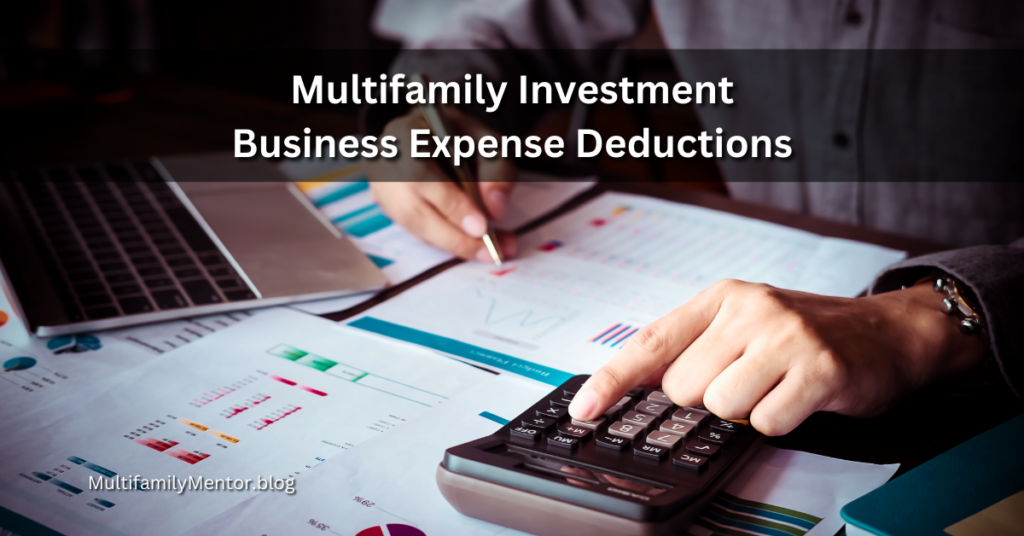Learn the importance of business expense deductions for multifamily investors as well as how to correctly claim them. Contact a tax expert to maximize your returns.
Executive Summary
The process of investing in multifamily properties is complicated and entails a number of costs, including management fees, repairs, and property upkeep. On your tax return, you can use business expense deductions to offset these costs. In this post, we'll go over the many business expenditure deductions that multifamily investors can take advantage of and offer advice on how to do so.
Introduction
Investing in multifamily properties can be a profitable strategy to increase wealth and provide passive income. But, it also entails a number of costs, such as management fees, repairs, and property maintenance, which may quickly add up. It's critical to comprehend how to balance these costs by deducting business expenses from your taxable income in order to maximize your investment.
What do Multifamily Investment Business Cost Deductions Entail?
A form of tax deduction called a business expenditure deduction enables multifamily investors to subtract from their taxable income the costs related to operating their investment property. The costs must be reasonable and required to maintain the property in order to be eligible for these deductions. Informational tidbits to think about for this subtopic:
- To qualify for business expenditure deductions, the expenses must be directly tied to the operation of the property and not for personal use.
- Ordinary and necessary expenses can include repairs, maintenance, property management fees, and utilities.
- Schedule E of the investor's tax return is where business expenditure deductions are claimed.
Types of Expenses that Qualify for Business Expense Deductions
Investors must be aware of the allowable expenses in order to claim business expense deductions for multifamily investments. They can consist of utilities, property management fees, repairs, and upkeep. But not all costs are eligible, therefore it's crucial to understand which costs can and cannot be written off.
With this subtopic, it's important to remember that repairs and maintenance costs are deductible as long as they are required and commonplace.
- Over the course of several years, depreciation costs are also deductible.
- Personal expenses, such as renovations to one's house, are not tax deductible.
- Travel expenses and other costs not directly associated with maintaining the property are not tax deductible.
How to Claim Expenses for Business
Investors who invest in multifamily properties must submit Schedule E of their tax return in order to claim business expenditure deductions. Investors can declare their rental income, expenses, and any business expense deductions on this form.
Investors must maintain precise records of their costs and rental income, among other pertinent information.
• Personal and business expenses must be subtracted from one another;
• Company expenses cannot exceed rental income.
Pointers to Increase Business Expenses Deductions
Investors can take a number of actions, such as maintaining correct records, depreciating assets, and employing a property manager, to maximize business expenditure deductions for multifamily investing. These techniques can lower tax obligations and boost returns on investments.
- Accurate spending records are essential for claiming business expense deductions.
- Employing a property manager can offer significant tax benefits and lessen the investor's workload.
- Investors can also think about working with a tax professional to make sure they are claiming all allowable deductions.
Conclusion
Business expense deductions are a crucial component of multifamily investing. Investors can lower their taxable income and ultimately boost their bottom line by claiming the appropriate deductions. Multifamily investors are eligible for a variety of deductions, including those for interest, depreciation, and repairs and upkeep. Investors should seek the advice of a tax expert to be sure they are maximizing all allowable deductions and adhering to all applicable rules and regulations.
Last, knowledge of business expense deductions is essential for profitable multifamily investing. To ensure adherence to tax rules and regulations, investors must be aware of eligible deductions, maintain proper records, and seek the advice of a tax specialist. Investors can maximize their deductions, lower their tax obligations, and ultimately boost their returns on investment by adhering to these rules.

